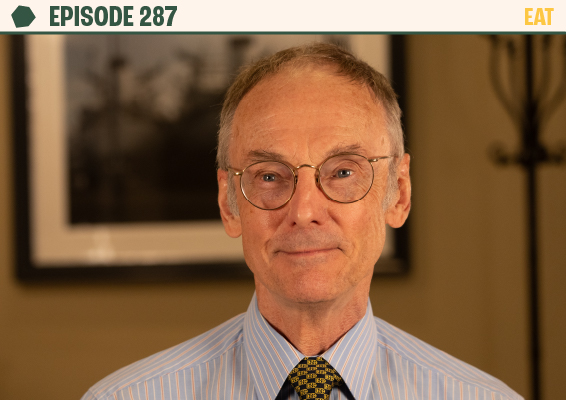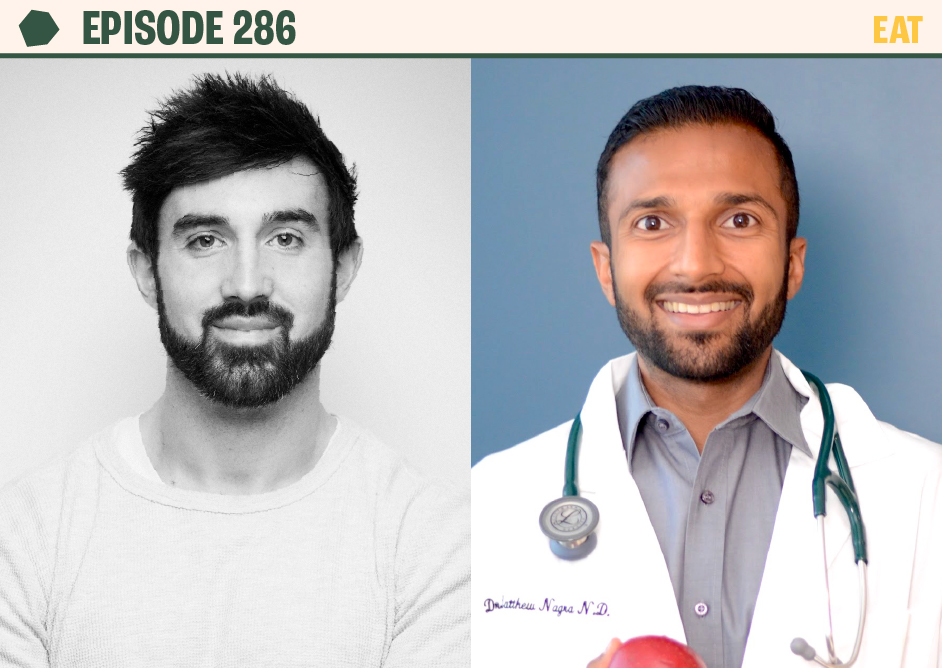Join me to tackle what is perhaps the most fiercely debated topic in nutrition circles and online forums: canola oil. There’s been an absolute explosion of canola oil criticism in recent years; even the simple statement that canola oil might not be the enemy is enough to spark huge debate. In Episode #288, I sit down with Dr Gil Carvalho for an objective analysis backed by a comprehensive evaluation of the available evidence.
“I just don’t see the justification for the stampede.”
Dr Gil Carvalho is a respected physician and research scientist with a profound depth of knowledge in nutrition and genetics. Educated as a medical doctor at the University of Lisbon and holding a PhD in Biology from the California Institute of Technology (Caltech), Dr. Carvalho has made significant research contributions in fields spanning molecular biology, aging, and neuroscience. He’s also the creator of Nutrition Made Simple, a platform aimed at distilling complex nutrition concepts for the public. Renowned for his expertise and his dedication to clear, factual science communication, Dr Carvalho brings an insightful, evidence-based perspective on the health impacts of canola oil, unswayed by any conflicts of interest or affiliations.
“The evidence certainly doesn’t seem to support this idea that canola oil is giving us heart attacks and strokes and these things you hear on social media.”
This conversation centres around the complexities of canola oil, from its impact on biomarkers to chronic disease and lifespan. We discuss different types of canola oil, how it stacks up against other oils, and potential effects on cardiovascular disease, weight loss, and insulin resistance. Dr Gil Carvalho sorts through the facts and fiction, offering clear insights into the composition of canola oil and its true effects on health. You will leave this episode better equipped to navigate health claims such as those about canola oil, allowing you to make more informed dietary choices overall.
Specifically, we discuss:
- Introduction (00:00)
- What Inspired the Canola Oil Video (01:58)
- Defining Canola Oil: Origins and Composition (06:35)
- The Most Common Claims About Canola Oil (12:13)
- Research Methodology in Canola Oil Investigation (17:45)
- The Significance of Human Data in Canola Oil Research (22:48)
- Understanding Meta-analysis Studies and Epidemiological Approaches (26:37)
- Assessing the Adequacy of Canola Oil Research (42:07)
- Canola Oil’s Impact on Blood Lipids and Cardiovascular Health (46:20)
- Canola Oil vs. Nuts and Seeds for Weight Loss (50:36)
- Canola Oil Consumption and the Risk of Heart Attack/Stroke (56:48)
- Canola Oil and Blood Glucose Control (1:00:57)
- Canola Oil’s Influence on Body Weight (1:04:29)
- Is Canola Oil Inflammatory? (1:08:54)
- Examining the “Wash-IN-DIET Canola Oil” Study by Junker R and Kratz M (1:11:24)
- Lipid Peroxidation: Canola Oil Oxidation (1:14:44)
- Research on Liver Fat and Canola Oil (1:21:50)
- Linoleic Acid Consumption and Total Mortality (1:23:10)
- Reception of the Canola Oil Video within the NutritionMadeSimple Community (1:25:59)
- Addressing Common Questions About Canola Oil (1:33:02)
- Assessing Research Funding from the Canola Industry (1:37:19)
- Making the Case for Canola Oil Toxicity (1:40:19)
- Is Canola Oil Classified as an Ultra-Processed Food? (1:42:48)
- Future Studies Required for a Comprehensive Understanding of Canola Oil and Human Health (1:46:50)
- Conclusion (1:48:07)
A huge thank you to Dr Gil Carvalho for joining me in today’s conversation. I have no doubt that many people will walk away with a fresh perspective on not just canola oil but navigating scientific claims and the online landscape as a whole. If you found this episode heplful and think someone in your life might too, please make sure to share it with them.
You can learn more about Dr Gil Carvalho here, and connect with him on Twitter/X and Facebook. For straightforward, science-based nutrition information, visit his YouTube channel Nutrition Made Simple. You can also access his research publications for more.
This episode is brought to you by:
Optimise your health with InsideTracker’s biomarker analysis. Get exclusive access to InsideTracker’s new ApoB test and a 20% discount on your first order at insidetracker.com/simon.
The best way to support the show is to use the products and services offered by our sponsors. To check them out and enjoy great savings, visit theproof.com/friends.
More about Gil Carvalho, MD PhD
Gil Carvalho, MD PhD is a physician, research scientist, science communicator, speaker and writer. Dr. Carvalho trained as a medical doctor in the University of Lisbon, in his native Portugal, and later obtained a PhD in Biology from Caltech (California Institute of Technology). He has published peer-reviewed medical research spanning the fields of genetics, molecular biology, nutrition, behavior, aging and neuroscience.
In parallel with his research career, Dr. Carvalho also has a passion for science communication. In 2018, he launched Nutrition Made Simple, which aims to convey fundamental nutrition concepts to a lay audience via educational videos. His content has been watched by over a quarter million people.
Dr. Carvalho’s research contributions at Caltech, where he trained with pioneer geneticist Seymour Benzer, included the identification of genetic and nutritional mechanisms of longevity.
Dr. Carvalho also pursued research, with neuroscientist Antonio Damasio, on mechanisms of neural signal transmission in the sensory system and the neural basis of interoception and feeling.
He has been a member of the Genetics Society of America and the American Society for Neuroscience. His accolades include a Delill Nasser Award for Professional Development in Genetics and a Mathers Foundation award. Both his research contributions and his expert commentary are regularly featured in the media, including The Proceedings of the National Academy of Sciences, Nature Methods, the San Diego Union-Tribune, Quanta magazine and ScienceDaily. He is also a contributor to the Institute of Limbic Health and the T. Colin Campbell Center for Nutrition Studies.
Additional resources
- The effects of Canola oil on cardiovascular risk factors: A systematic review and meta-analysis with dose-response analysis of controlled clinical trials • PMID: 33127255
- A changing role for dietary monounsaturated fatty acids • PMID: 2646347
- Replacing dairy fat with rapeseed oil causes rapid improvement of hyperlipidaemia: a randomized controlled study • PMID: 21466598
- Dietary rapeseed/canola-oil supplementation reduces serum lipids and liver enzymes and alters postprandial inflammatory responses in adipose tissue compared to olive-oil supplementation in obese men • PMID: 25403327
- Cooking oil/fat consumption and deaths from cardiometabolic diseases and other causes: prospective analysis of 521,120 individuals • PMID: 33853582
- Effects of two high-fat diets with different fatty acid compositions on glucose and lipid metabolism in healthy young women • PMID: 8198055
- Cooking Oil Consumption Is Positively Associated with Risk of Type 2 Diabetes in a Chinese Nationwide Cohort Study • PMID: 32364230
- The Effect of Canola Oil on Body Weight and Composition: A Systematic Review and Meta-Analysis of Randomized Controlled Clinical Trials • PMID: 30809634
- Effects of two high-fat diets with different fatty acid compositions on glucose and lipid metabolism in healthy young women • PMID: 8198055
- Effect of fat sources on satiety • PMID: 12582212
- Effect of fat saturation on satiety, hormone release, and food intake • PMID: 19225118
- Ultra-Processed Diets Cause Excess Calorie Intake and Weight Gain: An Inpatient Randomized Controlled Trial of Ad Libitum Food Intake • PMID: 31105044
- Effects of diets containing olive oil, sunflower oil, or rapeseed oil on the hemostatic system • PMID: 11246548
- Dietary intake and biomarkers of linoleic acid and mortality: systematic review and meta-analysis of prospective cohort studies • PMID: 32020162
- Plasma and lipoprotein lipid peroxidation in humans on sunflower and rapeseed oil diets • PMID: 7651074
- Dietary fish oil-induced changes in the distribution of alpha-tocopherol, retinol, and beta-carotene in plasma, red blood cells, and platelets: modulation by vitamin E • PMID: 8317397
- Role of vitamin E in preventing the oxidation of low-density lipoprotein • PMID: 1985404
- Effect of fish and fish oil-derived omega-3 fatty acids on lipid oxidation • PMID: 15479562
- Effect of Deep Frying of Potatoes and Tofu on Thermo-Oxidative Changes of Cold Pressed Rapeseed Oil, Cold Pressed High Oleic Rapeseed Oil and Palm Olein • PMID: 34679771
- Exercise-induced oxidative stress • PMID: 8383786
- Exercise, oxidative damage and effects of antioxidant manipulation • PMID: 1514950
- Plant-sourced cooking oil consumption is associated with lower total mortality in a longitudinal nationwide cohort study • PMID: 32359931
- Cholesterol lowering effects of nuts compared with a Canola oil enriched cereal of similar fat composition • PMID: 16054553
- Mediterranean alpha-linolenic acid-rich diet in secondary prevention of coronary heart disease • PMID: 7911176
- A 2 year multidomain intervention of diet, exercise, cognitive training, and vascular risk monitoring versus control to prevent cognitive decline in at-risk elderly people (FINGER): a randomised controlled trial • PMID: 25771249
- Olive oil and walnut breakfasts reduce the postprandial inflammatory response in mononuclear cells compared with a butter breakfast in healthy men • PMID: 18952211
- Postprandial response of adiponectin, interleukin-6, tumor necrosis factor-alpha, and C-reactive protein to a high-fat dietary load • PMID: 18262390
- Original article: Effect of a 6-Month Interventionwith Cooking Oils Containing a High Concentrationof Monounsaturated Fatty Acids (Olive and Canola Oils) Compared with Control Oil in Male Asian Indianswith Nonalcoholic Fatty Liver Disease
- Effects of Temperature and Heating Time on the Formation of Four Toxic α,β-Unsaturated-4-Hydroxyaldehydes in Vegetable Oils • AOCS
- Temperature Dependence of HNE Formation in Vegetable Oils and Butter Oil • Springer
- Oxidative Stress • Springer
- Original Communication: A diet containing rapeseed oil-based fats does not increase lipid peroxidation in humans when compared to a diet rich in saturated fatty acids








